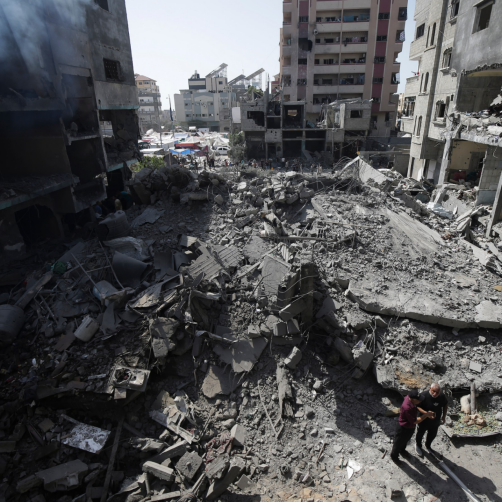
India Exports Rockets and Explosives to Israel Amid Gaza Conflict
By Fiona Nanna, ForeMedia News
8 minutes read. Updated 12:00PMGMT Wed, 26, 2024
In a stunning revelation, documents obtained by Al Jazeera show that India has been exporting significant quantities of rockets and explosives to Israel, despite the ongoing conflict in Gaza. This development, involving intricate international logistics and raising ethical concerns, has drawn the attention of global observers.
On May 15, the cargo vessel Borkum attracted international scrutiny when it paused near Cartagena, Spain. Protesters, waving Palestinian flags, urged Spanish authorities to inspect the ship, suspecting it carried weapons destined for Israel. Leftist members of the European Parliament sent a letter to Spanish President Pedro Sánchez, demanding the ship be prevented from docking. They warned that allowing the ship to dock would enable the transit of arms to Israel, a country under investigation for alleged genocide against the Palestinian people.
Before Spanish authorities could intervene, the Borkum altered its course and continued to the Slovenian port of Koper. Inigo Errejon, spokesperson for Spain’s hard-left Sumar party, argued that this decision confirmed their suspicions about the ship’s cargo.
Overlooked in the debate was the origin of the Borkum’s cargo. According to documents seen by Al Jazeera, the ship carried explosives loaded in India, destined for Israel’s Ashdod port, just 30 kilometers from Gaza. Marine tracking sites revealed that the Borkum departed from Chennai, India, on April 2, circumventing Africa to avoid the conflict-prone Red Sea.
The cargo included 20 tonnes of rocket engines, 12.5 tonnes of rockets with explosive charges, 1,500 kg of explosive substances, and 740 kg of charges and propellants for cannons. The documentation mandated strict confidentiality, prohibiting any mention of IMI Systems or Israel. IMI Systems, a defense firm acquired by Elbit Systems in 2018, is a significant player in Israel’s military-industrial complex.
Despite these revelations, the German company MLB Manfred Lauterjung Befrachtung, managing the ship, denied loading any weapons for Israel.
A similar incident occurred on May 21, when the cargo ship Marianne Danica, also from Chennai, was denied entry to Cartagena. Spanish authorities, citing its cargo of 27 tonnes of explosives bound for Israel’s Haifa port, blocked the ship. Foreign Minister Jose Manuel Albares confirmed the denial, citing the shipment’s military nature.
India-Israel Military Collaboration
These incidents highlight a growing military collaboration between India and Israel. India, historically a proponent of dialogue and negotiation in international conflicts, appears to be quietly supplying military materials to Israel amid its prolonged conflict in Gaza. Analysts point to a lack of transparency in India’s arms transfers, making it difficult to verify these shipments.
Zain Hussain, a researcher at the Stockholm International Peace Research Institute (SIPRI), noted that India’s collaboration with Israel, particularly in missile production, is well-documented. Indian company Premier Explosives Limited produces solid propellants for MRSAM and LRSAM missiles, Indian versions of Israel’s Barak missiles. The company’s executive director, T Chowdary, confirmed exports to Israel, highlighting a significant revenue increase from these orders.
Expanding Military Ties
India’s collaboration with Israel extends beyond missiles. In December 2018, Adani Defence & Aerospace and Israel’s Elbit Systems inaugurated a UAV manufacturing complex in Hyderabad. This facility produces Hermes 900 and Hermes 450 drones, used extensively by Israel in military operations. The production of these drones marks a significant technological transfer, allowing India to develop its own UAV capabilities.
While Adani Defence & Aerospace insists that exported drones are for non-combat operations, the potential use of these UAVs in Gaza raises serious concerns.
India’s Diplomatic Balancing Act
India’s military support for Israel complicates its diplomatic stance. New Delhi has traditionally positioned itself as a mediator in the Gaza conflict, calling for peace and supporting ceasefire efforts. However, reports of weapon exports to Israel threaten to undermine this narrative.
India’s diplomatic history reflects a complex relationship with Israel. Recognizing Israel in 1950 but establishing formal diplomatic relations only in 1992, India has balanced its pro-Arab policy with strategic cooperation with Israel. This cooperation intensified under Prime Minister Narendra Modi, who has publicly embraced Israel while maintaining ties with Palestinian leaders.
India’s strategic partnership with Israel includes technology transfers crucial for its security needs. Israel’s willingness to share advanced technology, particularly in drones and surveillance systems, has strengthened bilateral ties. Modi’s administration has further deepened this relationship, with Modi referring to Israeli Prime Minister Benjamin Netanyahu as a “friend.”
Despite these close ties, India continues to navigate a complex geopolitical landscape. It has abstained from UN votes condemning Israel while simultaneously calling for ceasefires and expressing concern over Gaza. This balancing act is crucial as India seeks to maintain good relations with both Israel and its Arab partners.
India’s role in supplying military materials to Israel amid the Gaza conflict highlights the intricate and often opaque nature of international arms trade. As India continues to balance its strategic interests and diplomatic relationships, these revelations may prompt a re-evaluation of its stance on international conflicts.
For more insights on global military collaborations and geopolitical dynamics, visit our News Section.
Backlinks
For more in-depth analysis, check out our related articles on India’s Diplomatic Strategies and Israel’s Military Operations.
This article aims to provide a comprehensive understanding of the complexities surrounding India’s exports to Israel amid the ongoing Gaza conflict. Stay informed with our latest updates.

